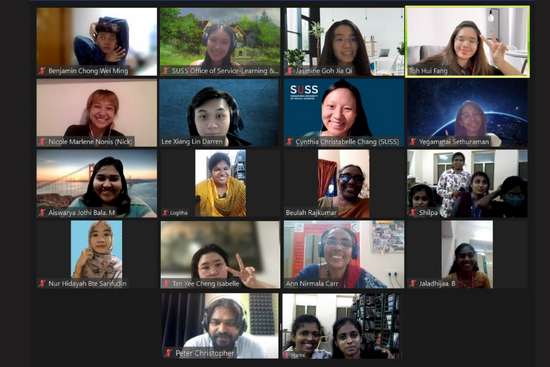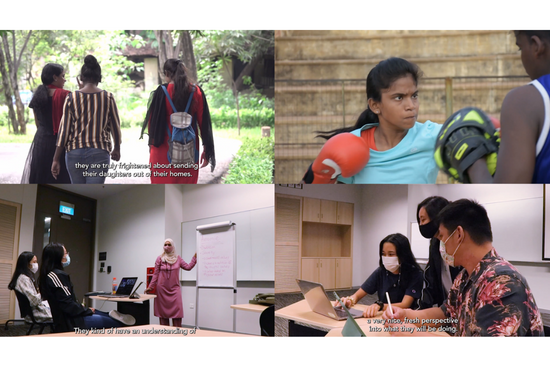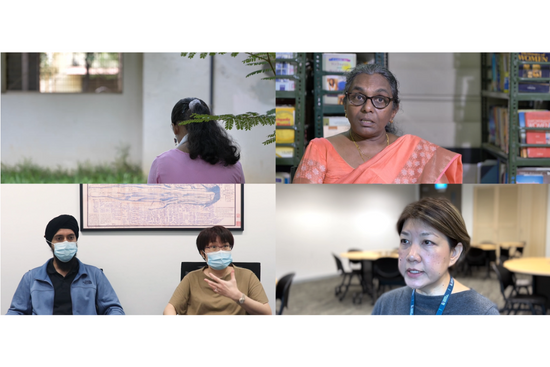SUSS recently partnered Lady Doak College (LDC) to roll out a virtual Global Service-Learning programme, Building Bridges and Breaking Barriers (BBBB), which enabled youths from Singapore and Madurai, Tamil Nadu, to utilise filmmaking techniques to spread awareness about good practices in gender equality to the community. The programme is supported by Youth Corps Singapore (YCS) under the National Youth Council (NYC).
 Participant and mentors of the Breaking Barriers and Building Bridges programme.
Participant and mentors of the Breaking Barriers and Building Bridges programme.
Undertaken with LDC’s Centre for Women’s Studies and International Study Centre over the course of four months from 25 August 2021 to 10 December 2021, BBBB connected students of both institutions to co-produce two short documentary videos. The videos explore the similarities and differences between successful contemporary cases of gender equality and justice in Madurai and Singapore. Demonstrating how good practices in gender equality are not universal, it emphasises the need for contextualisation to local conditions for these practices to be successful.
The programme facilitated a reciprocal partnership between the two institutions as Cynthia Chang, SUSS Assistant Director and Head (Office of Service-Learning & Community Engagement), Centre for Experiential Learning, remarked, “As fellow members of the Service-Learning Asia Network, SUSS’ partnership with LDC has come a long way. Overcoming the physical distance imposed on us by the pandemic, our close relationship enabled students from both our institutions to explore a mode of collaboration to serve and learn together in a way they could not have in person.”
Dr Beulah Rajkumar, the Advisor from the Centre for Women’s Studies in LDC, shared, “Coming from two countries with a wide disparity in terms of size, economic standing and cultural backgrounds, the programme helped the students to learn about each other. As they explored their similarities and bridged differences, the students forged their potentials to highlight gender disparity and also learnt to work cross-culturally. The exercise helped in developing relationships and understanding which will last a lifetime.”
Through the programme, participants were equipped to tackle gender equality issues and were taught specialised videography skills. The first video entitled “#NotAlone”, focuses on how sexual harassment is addressed by different communities, while the other entitled “#EMPOWER”, showcases the various good practices that several tertiary institutions have implemented to empower women within their context.
#NotAlone | How Are Communities Addressing Sexual Harassment?
The #NotAlone documentary was created by four SUSS students and four LDC students, mentored by both staff from LDC and SUSS. This documentary aims to raise awareness and help others better understand sexual harassment in both Singapore and India. It features stories from survivors and explores their views on the ways society can prevent and support victims.
 Stills from the #NotAlone documentary.
Stills from the #NotAlone documentary.
“I feel very honored to be able to work with LDC and be part of this project, it has challenged and broadened my perspectives, and taught me many valuable lessons. For my team, we hope that when the victims of sexual harassment watch our film, they will know that they are not alone and there are people to support them. I am really thankful that we were able to work together in creating a social change for our societies,” said Isabelle Tan Yee Cheng, participant of BBBB and SUSS Marketing student.
“The workshops gave me a rare opportunity to know about SUSS students, their perspectives and cultures, especially how some forms of gender inequalities persist over both Singapore and India. I realised how sensitive and triggering it is for survivals to share their sexual harassment experiences, and how it affects them both psychologically and socially. The collaboration with the SUSS students gave our documentary a different perspective and I loved the workshop and the collaboration with the SUSS students,” said Ms Harini, a participant of BBBB from LDC.
Through documenting how schools are working to create a safer environment for students, the narrative hopes to promote good practices in hope that viewers will be better informed and equipped to support members of the community who have gone through similar experiences.
#EMPOWER | How Tertiary Institutions Empower Women
The #EMPOWER documentary was created by four SUSS students and four LDC students, mentored by both staff from LDC and SUSS. The documentary shows how schools are minimising and preventing gender inequality by providing equal opportunities for both genders to succeed in a male-dominant industry. Based in India and Singapore, the film showcases how school-based activities such as co-curricular activities and the planning of curriculum encourage inclusivity of both genders.
 Stills from # EMPOWER.
Stills from # EMPOWER. “We made a film about tertiary education's influence on women empowerment because during our discussions, we found Lady Doak College an oasis for students to develop their skills and personalities. It paved ways for students to overcome their inhibitions as women, boost their self-esteem and to know about themselves. It was my first experience working with overseas friends and I was stunned by their active participation, collaborative work and friendship. I’m glad to have made new friends and grow,” shared Logitha MA, a participant of BBBB from LDC.
Through the documentary, the team advocated for steps towards gender equality through tertiary education through their sharing of successful stories.
This collaboration between SUSS and LDC paved the way to build more understanding about gender issues among youths, to create a safe space for diversity and inclusion. Dr Ann Nirmala Carr, Coordinator of LDC’s CWS, opined that student teams working across borders on a common issue of sexual harassment have deftly called attention to the important issue of silent acceptance of the grave offence of sexual abuse. CWS addresses numerous harassments complaints and it is a tremendous learning to know how it is done at the SUSS.
She added, “After this workshop, the team in LDC has worked to put in place safe sharing spaces. Amidst the barriers of not being together in a physical space, one big takeaway of this programme is the beautiful collaboration and forging of great relationships between LDC and SUSS!”